The converted office/library features a wood-clad tray ceiling.
Photography by Derek & Vee
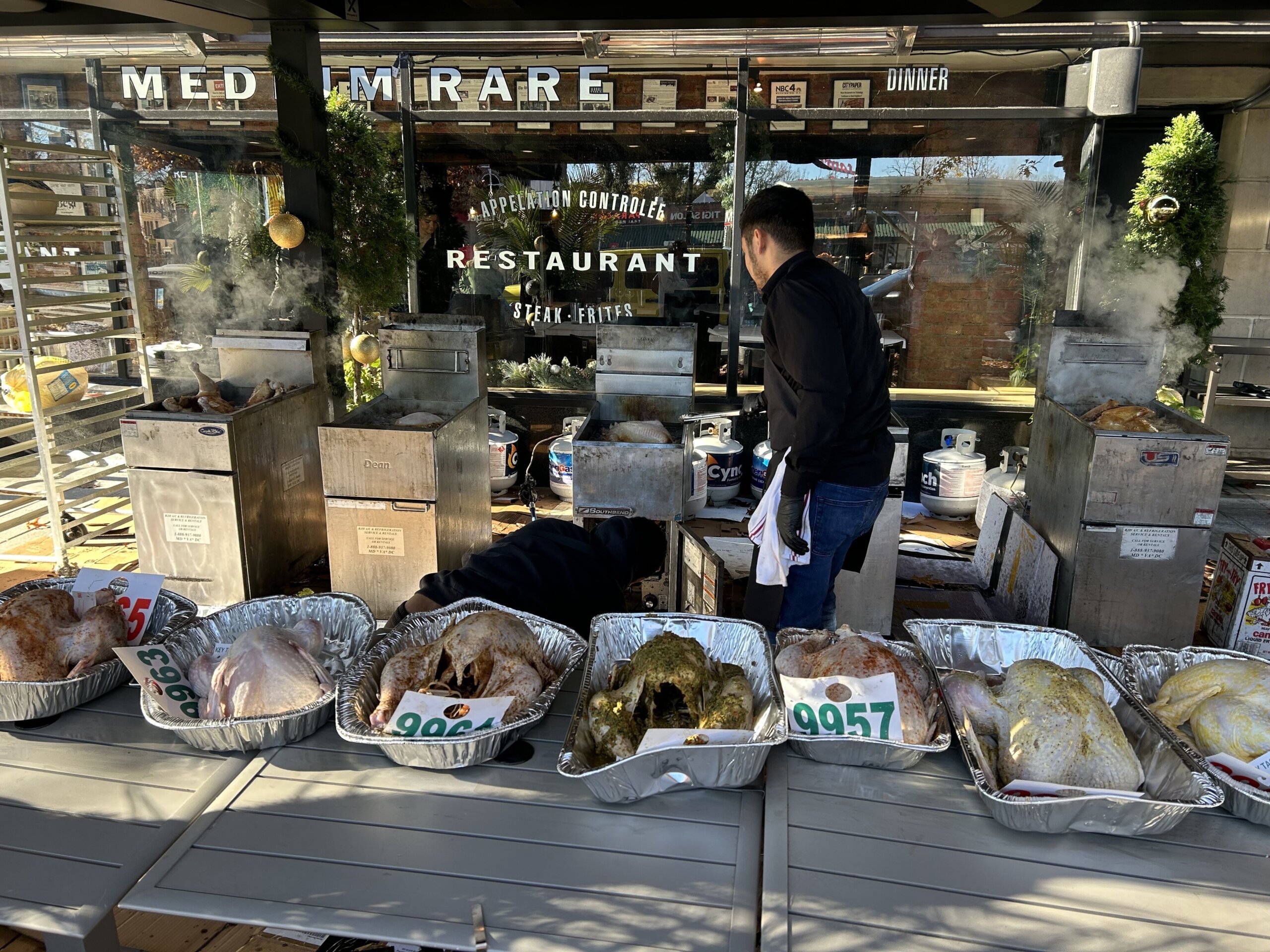
This page contains a video which is being blocked by your ad blocker.
In order to view the video you must disable your ad blocker.
Dozens of people lined the street corner near Medium Rare in Cleveland Park on Thursday morning, dropping off their turkeys with a team of efficient volunteers working to support the community on the Thanksgiving holiday.
Since 2008, the Northwest D.C. restaurant has offered to fry turkeys for anyone, for free, and has some on hand for those who may come by seeking one.
Co-owner Mark Bucher said he expected to fry about 600 turkeys, adding that over 80% are from people who received donated turkeys, but “don’t have the ability to cook them, or the wherewithal to cook them. An aluminum pan costs $8. It’s a lot.”
The team started the event in 2008, when Bucher described frying turkeys as the popular thing to do, and he wanted to ensure nobody burned down their home or restaurant. About 20 turkeys were fried that day, he recalled, and after that first time he was left a bit of a mess. He’d burned his arms and ruined his clothes in the process.
Heading back to his car with his daughter after a long day of lugging turkeys and hot oil, he thought he saw a parking ticket tucked under his windshield wiper.
“I’m like, ‘Man, who gave me a ticket?’” Bucher recalled.
But that’s not what it was.
WTOP/Scott Gelman
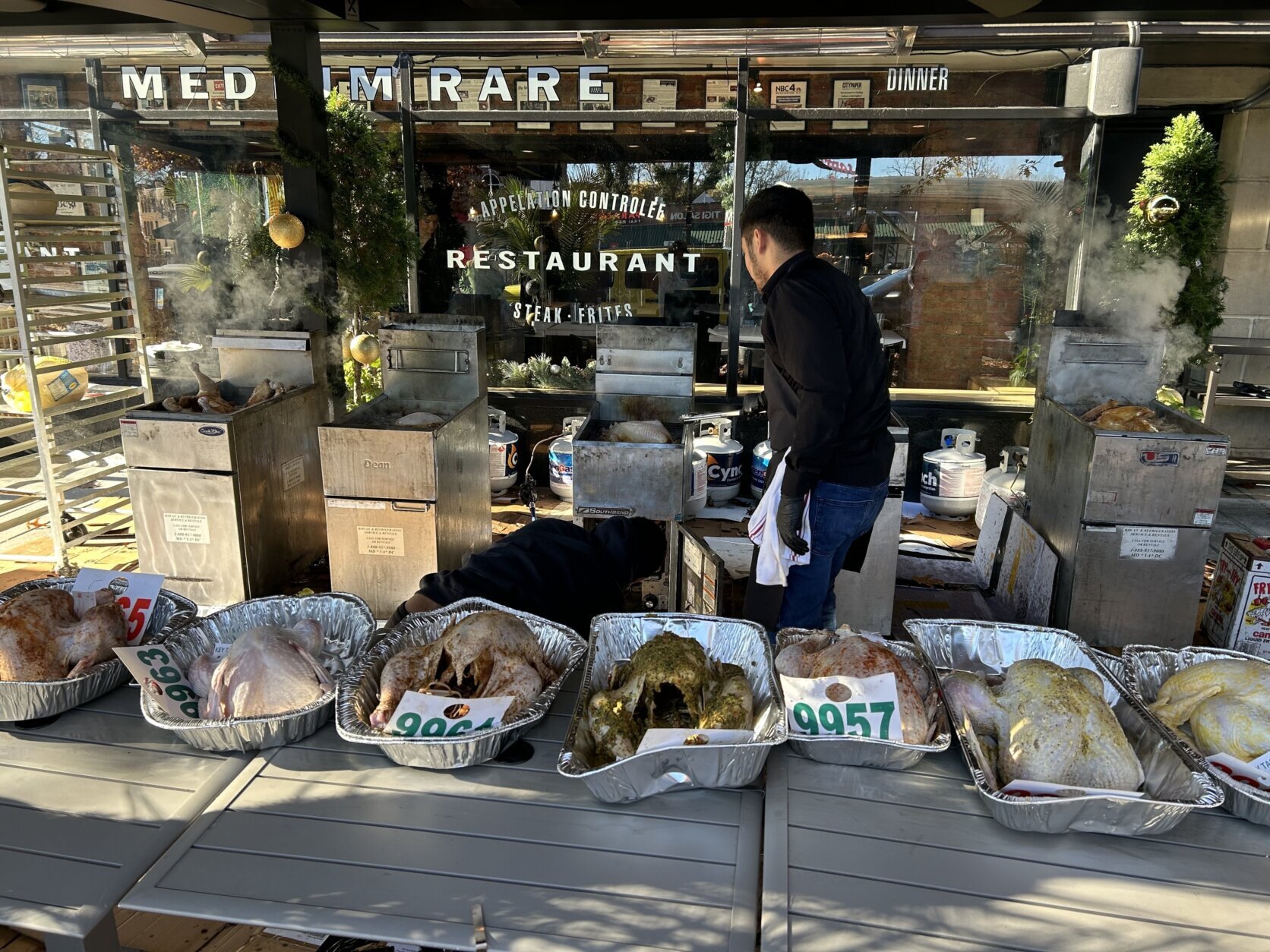
WTOP/Scott Gelman
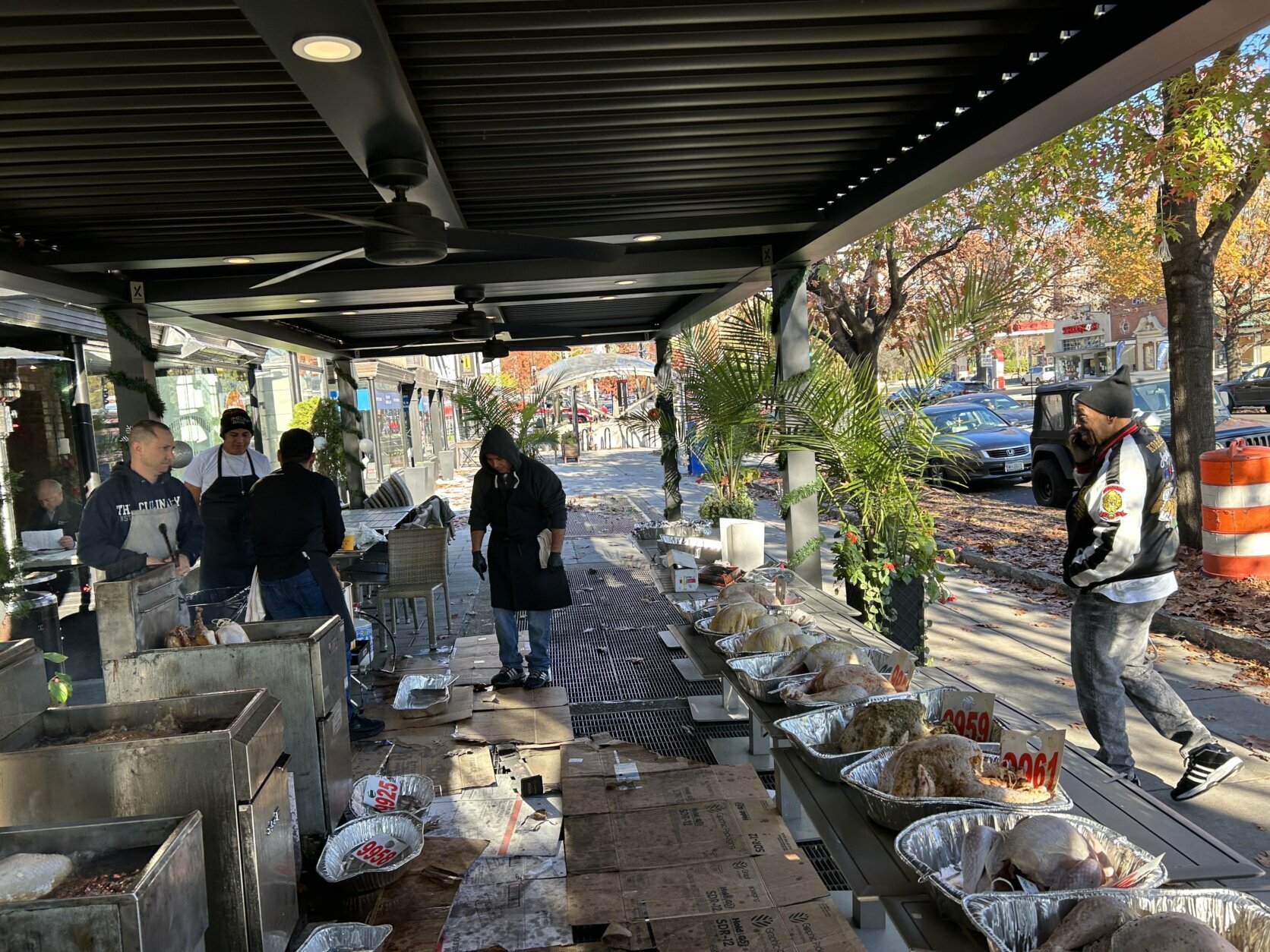
WTOP/Scott Gelman
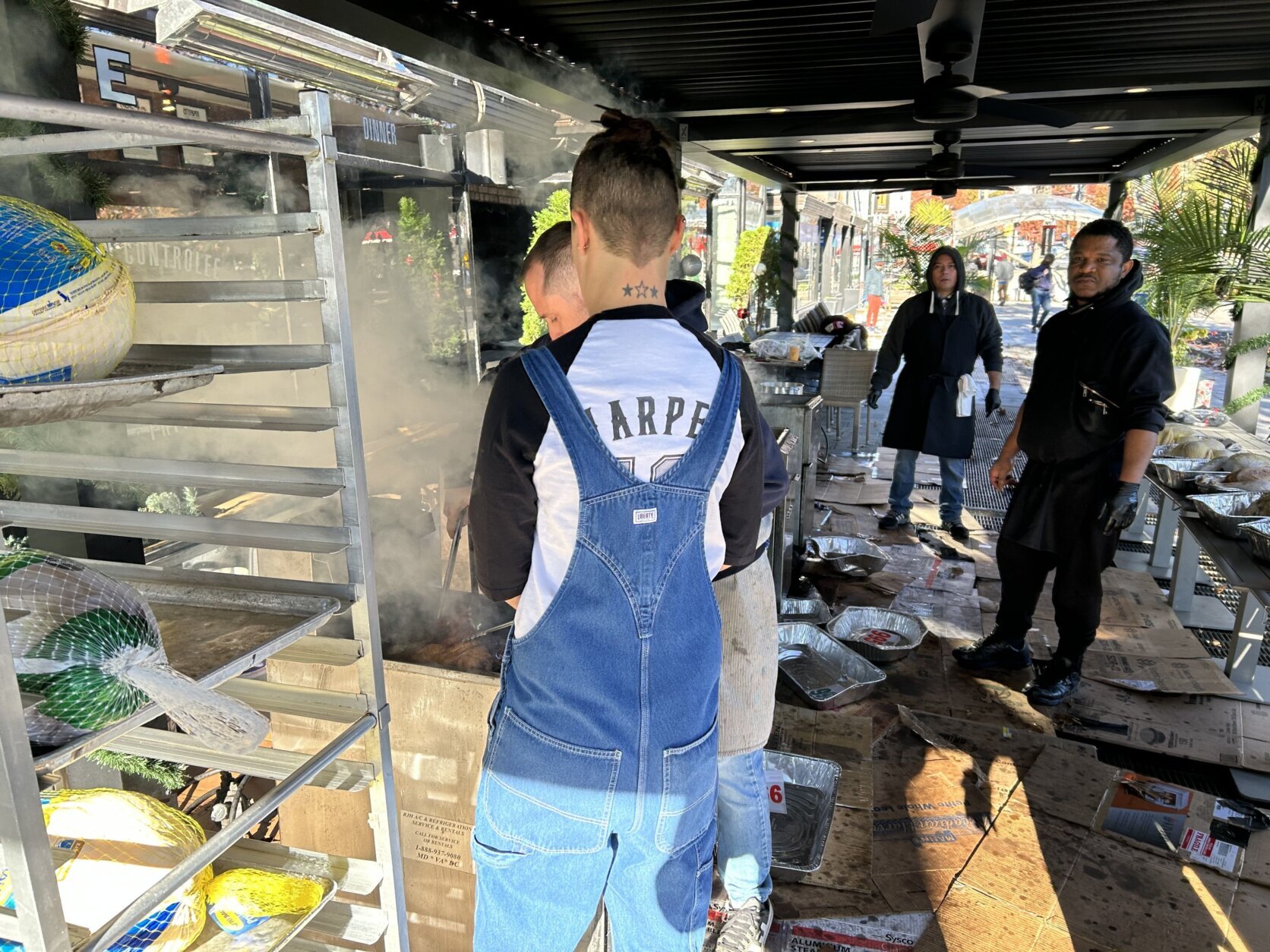
WTOP/Scott Gelman
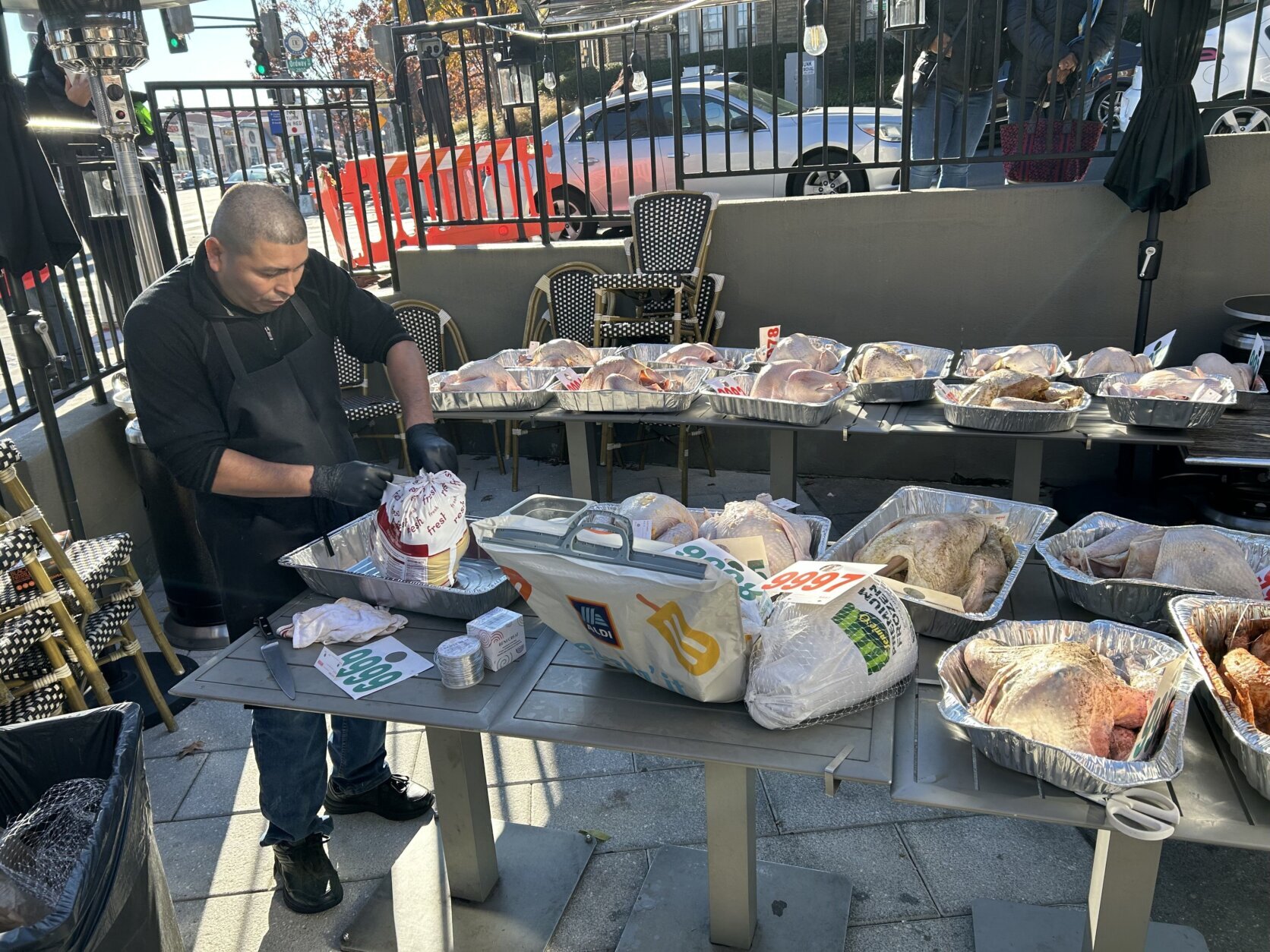
WTOP/Scott Gelman
“It was a note from a family that lives in a shelter across the street from the restaurant,” he said. “I had no idea the shelter was there, people live among us all, right, that thanked us for cooking their turkey because they wouldn’t be able to have Thanksgiving without it. And that was the beginning of, I can’t stop.”
It has evolved into a tradition that Bucher said became so popular during the pandemic that turkeys had to be fried at Nationals Park.
“What makes this so special is we hear thanks from so many different members of our community, from folks that are food insecure, and families that are food insecure, to neurosurgeons,” Bucher said.
While they waited for their turkeys, many people lingered inside the restaurant, speaking to strangers or reconnecting with others they may have bumped into in years past.
Every turkey received a number tag, so they’re all accounted for, and there were five fryers outside that handle two turkeys each for 20 minutes at a time. One person managed each fryer, and runners bring them back and forth to be cooked or to a table when they’re done.
Recently, the event became a fundraiser for Bucher’s nonprofit Feed the Fridge, which offers free meals to people who need them most.
Debbie said she tried to fry a turkey a few years ago, but it became complicated, because of the amount of oil required and how much time it takes. But, she said, it’s worth the wait, because it tastes much better than turkey cooked in the oven.
It’s “crispy on the outside, moist, not typical dry turkey. That’s out the window. I like dark meat, but I’ll eat the entire turkey if it’s fried,” she said.
Monica stopped by the restaurant Thursday morning upon her mom’s recommendation.
“I didn’t want to burn down the house,” she said.
Anita said she’s never had fried turkey, but noted that the smell from the sidewalk made her confident in her choice.
“It’s so inviting, and it makes you want to call your family, friends and tell them come on up here and get your turkey fried,” she said.
David Daniels, from Mobile, Alabama, said his turkey would taste better than anyone else’s, because of the way it’s seasoned.
“We use a lot of French Creole seasoning,” Daniels said. “We also have some garlic powder, onion powder, and a whole bunch of other spices, but you just blend it all in. And then we base it in a hot orange sauce. So we’re gonna get a lot of flavors, and it’s gonna be extra intense.”

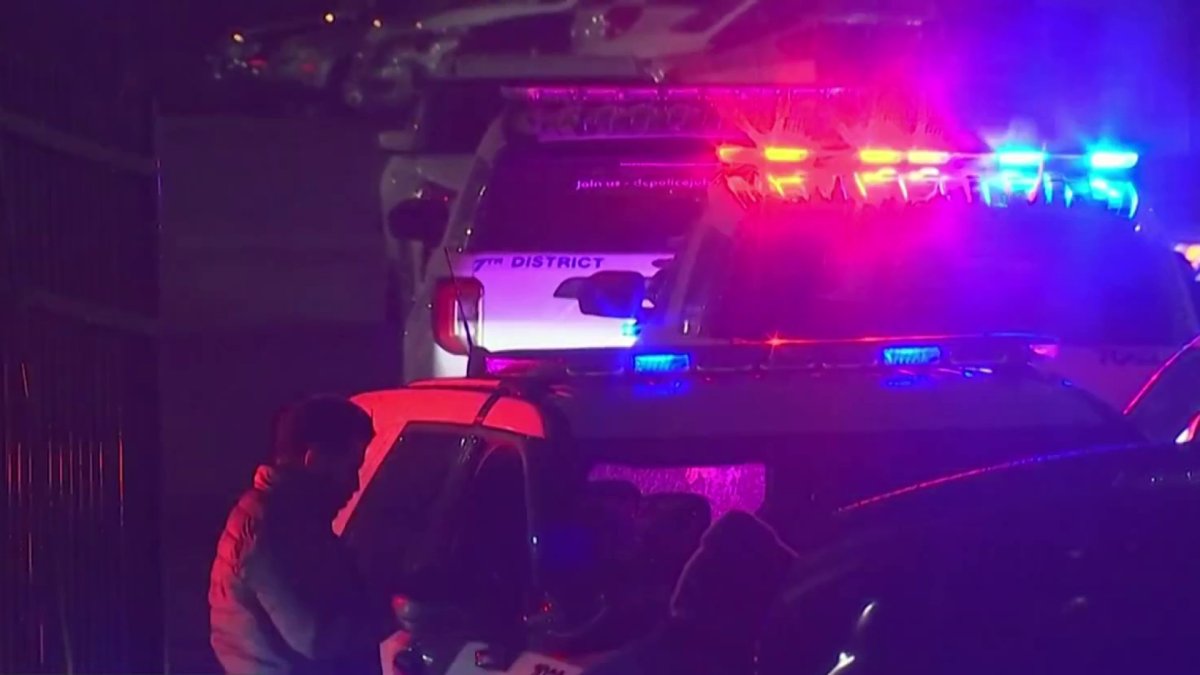
Skip to content

Contact Us

A landmarked Gilded Age manor is a rare find on the market in the nation’s capital. But one address matching the profile just listed with ties to the founder of the National Press Club, one of the world’s leading professional organizations for journalists. Now listed for $10.5 million, the four-story mansion includes a host of modern amenities that complement its historic appeal. Daniel M. Heider of TTR Sotheby’s International Realty holds the listing.
Named the Owl’s Nest, the mansion was built in 1897 as a country house for journalist William L. Crounse within the Forest Hills community. He tapped Appleton P. Clark, Jr. to design the hilltop retreat, which DC Historic Sites credits as “one of the city’s best examples of the Shingle style.” The nearly two-acre property was reportedly bought by the Jewish Day School in 2001 with plans to tear it down. It was designated a historic landmark that same year, amid those efforts, and Washington developer Chris Donatelli was next in line to buy the pad for $2.69 million in 2007.
The converted office/library features a wood-clad tray ceiling.
Photography by Derek & Vee
The property had fallen into disrepair by that time. So, Donatelli hired local architect George Myers and Gibson Builders for a major renovation that expanded and modernized it before moving in a year later. It now spreads out across 10,780 square feet in two wings, one restored and one brand new, with eight bedrooms and eight bathrooms.
While its many special details, including a stone archway at the entrance, a central turret, and stained-glass panels, speak to the home’s past, Donatelli’s time at the residence gives it even more political cachet. The architect and his wife, Karen, often hosted high-profile events at the home in Forest Hills where “wealthy Washingtonians would weekend,” Heider tells Mansion Global. Their most notable guest was former President Barack Obama, who reportedly attended a dinner party in 2014. “It’s the perfect home for a diplomat, an ambassador, or global CEO,” he continues.

A light-filled bedroom sits at the top of a three-story stone turret.
Photography by Derek & Vee
Massive stone walls are exhibited along the home’s castle-like façade, plus asymmetrical massing that gives it a pleasantly uneven shape and weight, visually. Inside the grand foyer, a wood-paneled staircase sits across the way with a stained-glass window depicting an owl. The home’s name and this detail honor the land’s history of attracting owls as one of the highest points in the D.C. area. Standout spaces added onto the mansion include a chef’s kitchen with custom cabinetry and Wolf appliances, a converted library with a barrel-vaulted ceiling, and two covered porches.
RELATED: A New Report Shows Where Luxury Home Prices are Expected to Increase Around the Globe
The primary suite is situated on the second floor with a covered terrace and spa-like en suite featuring checkered marble flooring. The abode’s top level, meanwhile, provides access to the airy turret bedroom with mullioned windows. Back downstairs, a sun-soaked rear patio with a lap pool and alfresco dining space rounds out the Owl’s Nest in northwest D.C.
Click here for more photos of the sprawling Washington, D.C. mansion.

Photography by Derek & Vee

Donald Trump has often cast Washington, DC, as an urban hellscape, but the city’s mayor, Muriel Bowser, said she had a “great meeting” with the president-elect on Monday and came away “optimistic that we will continue to find common ground.”
During this year’s presidential campaign, Trump depicted the District of Columbia in dystopian terms. “We will take over the horribly run capital of our nation in Washington, DC and clean it up, renovate it, rebuild our capital city so there’s no longer a nightmare of murder and crime,” he said at a rally in August.
/cdn.vox-cdn.com/uploads/chorus_asset/file/25672934/Metaphor_Key_Art_Horizontal.png)
/cdn.vox-cdn.com/uploads/chorus_asset/file/25672934/Metaphor_Key_Art_Horizontal.png)
There’s a reason Metaphor: ReFantanzio’s battle music sounds as cool as it does


France’s new premier selects Eric Lombard as finance minister


On a quest for global domination, Chinese EV makers are upending Thailand's auto industry


New Year life lessons from country star: 'Never forget where you came from'
/cdn.vox-cdn.com/uploads/chorus_asset/file/24982514/Quest_3_dock.jpg)
/cdn.vox-cdn.com/uploads/chorus_asset/file/24982514/Quest_3_dock.jpg)
Meta’s ‘software update issue’ has been breaking Quest headsets for weeks


Passenger plane crashes in Kazakhstan: Emergencies ministry


It's official: Biden signs new law, designates bald eagle as 'national bird'


'Politics is bad for business.' Why Disney's Bob Iger is trying to avoid hot buttons